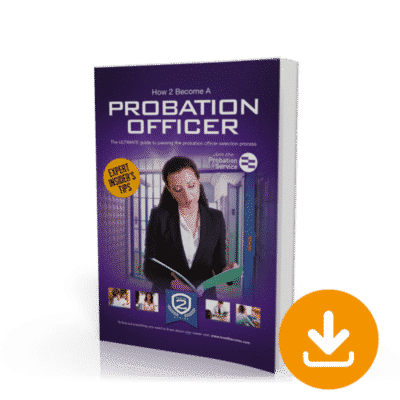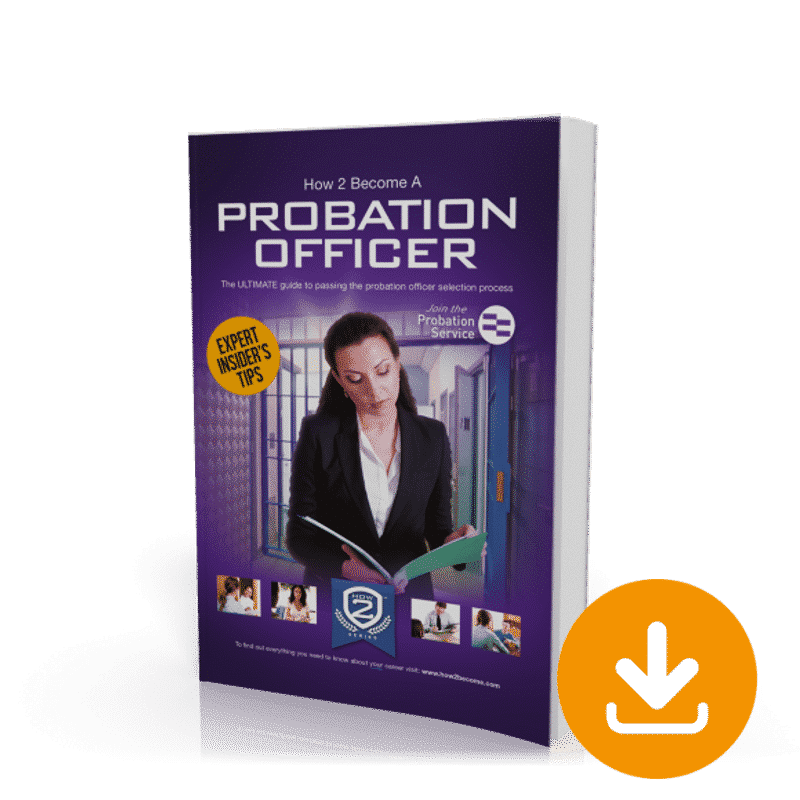How to become a probation officer
Join the Probation Service with this downloadable comprehensive career guide – How to Become a Probation Officer. Achieving a NOMS career is no easy feat and only those who prepare fully will be successful. Our 200 page guide will walk you through your entire application process and provide you with example high rated answers for each section. Pass the probation officer selection process today and join one of the most respected organisations in the UK!

THE ROLE OF A PROBATION OFFICER / OFFENDER MANAGER
The role of a Probation Officer is primarily to deal with individuals who are currently serving, or have previously served, prison or community sentences. Sometimes, you will also work with these individuals before they are even sentenced.
- Ensure that offenders carry out their punishment in a problem-free manner;
- Help offenders who have been released make a smooth transition back into the community;
- Educate offenders on how their crimes have impacted both their victims and the general public.
Other duties include:
- Overseeing post-sentence interviews with offenders;
- Gathering facts and information to inform risk assessment and sentence planning;
- Implementing sentence plans;
- Encouraging the offender to carry out the sentence planning;
- Carry out the completion of OASys assessments for prisoners not yet within OM Model arrangements.
For some people, this might sound intimidating. The thought of working with (sometimes hardened) criminals is particularly daunting. Throughout our guide, you will find a number of sample exercises, which will test you on-the-spot in regards to a particular situation. These will provide you with initial and theoretical experience in dealing with some of the situations that you might encounter whilst working as a Probation Officer. Crucially, these exercises will also test you on the core competencies required for the role.
These competencies will include:
As a Probation Officer, your communicational ability will be your biggest and most important tool. There is arguably no attribute that is more essential to the role of a Probation Officer than good communication.
The majority of your working hours will be spent dealing with extremely difficult individuals, many of whom will be uncooperative. You’ll have to demonstrate extensive powers of persuasion and negotiation in order to convince these individuals to agree with your proposed course of action, and there will be times when they simply refuse to listen to you altogether. In these cases, you’ll have to be incredibly patient and understanding. Although you might feel it, you must never show anger or frustration towards offenders. There will be times when you must be stern, and you will have to make decisions that are difficult, but you must always be polite and respectful no matter who you are dealing with.
As mentioned, when working as a Probation Officer you will need to demonstrate a respect for others at all times. It is extremely important that you aren’t judgemental, and treat every person that you work with as fairly as possible.
There will be many occasions when you find yourself working with people whom you don’t necessarily get on with. It’s crucial that you don’t go into these meetings with preconceived ideas. Remember that your goal is to help offenders, not judge them. The best way to do this is treat every case with an open mind. An understanding of diversity also falls under this competency. There may be times when you have to deal with ethnic offenders, or even racial issues that have arisen with other offenders.
For more core competencies, and advice on how to demonstrate them, purchase our fantastic guide!
Whether you are someone looking to get into the field, a trainee probation officer, or someone already employed as Probation Services Officer, the first place to start looking is online. Due to governmental changes (as of July 2014) up to 70% of Probation Services Officers and Probation Officers, are now employed by outside agencies, where previously they were employed by local probation trusts. This means that while you can still apply via the NOMS (National Offender Management Service) careers service, you should also expand your search to other external sources. In this section, we’ll give you some advice on how to fill in online Probation Application Forms.
Below we have included a mock job description for a Probation Services Officer, to give you some idea of what you might expect to see:
HOW TO BREAK DOWN THE APPLICATION FORM
When studying a job application, it is important to break down the key qualities that the application is looking for. This is best accomplished by breaking down the application form into manageable sections. Below is a way in which the above application can be broken down in order to make it easier to understand:
‘Arranging, supervising and monitoring community work placements for offenders’.
This duty will require your ability to organise activities or placements for offenders.
It will also require you to be an adaptable person, who is prepared to find alternative means to solving issues.
Finally, you’ll need to use risk assessment skills to establish whether the placement that you have arranged is suitable for the candidate who is taking it.
For more top tips on how to break down job applications, purchase our fantastic guide!
Along with the standard set of questions that you would expect to be asked in an application, the online form will also ask you a number of competency based questions. This section is the most important part of the application form, and will test your knowledge of the role and motivation for joining the service. It is the most common area (pre-assessment) in which candidates fall down, and therefore you need to pay careful attention to the way that you answer. Below is a sample question that you might expect to see in the application form, along an example of how to go about answering it:
There are a number of reasons why organisation is important in this role. As Probation Services Officers, we are tasked with enormous amounts of responsibility. It’s vital that officers are able to stay on top of things, so that they can provide a good service to clients. As Probation Services Officers, it is imperative that we can set a good example to both the public, and to the offenders we are working with. In order to perform the job successfully, we need to generate a level of faith and respect from all of the individuals we come into contact with. Keeping organised and on top of things is extremely important when it comes to submitting case files for review, general offender management and being called upon as a witness.
NVQ LEVEL 4 IN COMMUNITY JUSTICE
The NVQ Level 4 qualification in Community Justice is essential to your career as an aspiring Probation Officer. You will have to work for at least a year in the post of Probation Services Officer, as well as completing an NVQ Level 4 in Community Justice.
The NVQ in Community Justice will teach you a number of key skills that you will need to be aware of if you wish to become a competent Probation Officer. The course will be taught using different modules, with each module focusing on a particular area of the Probation Officer’s role. The NVQ will also teach legal framework, and further your understanding and abilities in the core competencies of the role.
Below we have outlined 1 of the typical modules you should expect to see when taking your NVQ Level 4:
COMMUNITY SUPERVISION
This unit focuses on the way in which Probation Officers carry out the fundamental supervisory aspects of their job, including planning, enforcing and monitoring community sentences. It deals specifically with the way that officers work with offenders who are not currently incarcerated, for one reason or another.
The topics in this unit will include:
- The impact that crime can have on victims and the way that Probation Officers can work to prevent this;
- How Probation Officers can conduct research into offender behaviour and then use it to influence and improve behavioural patterns;
- How Probation Officers can review and evaluate sentences, and produce interventional methods in accordance with these if necessary;
- The importance of clarification and ensuring that offenders fully understand their requirements during probation;
- Procedures for dealing with offenders who are considered ‘high risk’ or ‘very high risk’.
For a comprehensive overview of potential Probationary modules, purchase our fantastic guide. The units we have listed are just some of many, all of which will introduce and help Probation Services Officers in terms of key concepts of probationary work.

PROBATION OFFICER ASSESSMENT CENTRE
Once you have completed a year’s work as a Probation Services Officer, and completed the NVQ Level 4, you will be ready to move on and take the next step in becoming a fully qualified Probation Officer.
The process of becoming a Probation Officer is as follows:
- Initial Application Form;
- Assessment Centre, including written tests, presentations and psychometric tests;
- Probation Officer Interview;
- On the job training and further qualifications.
If you are successful in your application form, you will be invited to attend an assessment centre at an undisclosed location. The assessment centre will require you to undertake a series of challenging exercises, both individually and as part of a team.
This will conclude with a final interview, whereby you will be tested on how well you fit the role personally, and assess your knowledge of the core competencies. While the assessment tests can vary according to which provider you are applying to, the format is generally as follows:
The written test is generally the first stage of the assessment centre. It lasts for up to 90 minutes, and is used to assess the following skills:
- Communication;
- Planning and Organising;
- Problem Solving;
- Adaptability and Flexibility.
Requirements: To be eligible for this role, applicants will need at least one year of substantial experience in probation work or of working in a similar environment.
In the written test, you will be given an example scenario, and some basic information to go along with it. You’ll have to read over all of this information and then produce a report documenting your decisions and the reasons that you have made them.
The next stage in the process is the presentation. This will be presented to and assessed by two examiners, and will last approximately ten minutes. In some cases, you might be asked to perform two presentations. The exact details and title of your presentation will be provided to you prior to attending, meaning that you will have ample time to prepare.
As with every element of the selection process, there are a number of criteria which you will be judged against during the presentation:
- Ability to relate to others;
- Communication;
- Planning and organising;
- Self-management;
- Problem-solving
The title of the presentation will normally be based around one of the above qualities. For example, you might be asked to give a presentation on the steps that you took to solve a difficult problem. You will be assessed against the content and the way that you communicate the content to the assessors.
The third stage of the assessment centre is the psychometric tests. A psychometric test is based around the key skills and attributes that are required for the job role for which you are applying. The types of psychometric tests you will be expected to sit will very much depend on the position to which you are applying.
The most common types of test you’ll see during the probation officer selection process are:
- Numerical Reasoning. This will test your mental arithmetic, data interpretation, quantitative reasoning, speed / distance / time, charts and graphs.
- Non Verbal Reasoning. Spatial, abstract and inductive reasoning.
- Memory Tests. Remember words or phrases over a set amount of time.
Requirements: To be eligible for this role, applicants will need at least one year of substantial experience in probation work or of working in a similar environment.
PROBATION OFFICER INTERVIEW
If you are successful in your assessment centre, you will be invited to attend an interview. The speed at which this takes place will depend upon the provider to whom you are applying. For example, some providers might decide to have you take the interview at the actual assessment centre, whereas others may require you to wait and attend an interview at a separate location.
The interview itself will be conducted with 2 or 3 specialists within the field, usually with a Senior Probation Officer. In a sense, you can break your interview into two separate phases, ‘the getting to know you phase’ and ‘the competency phase’. In the second phase, you’ll be directly tested on how well you understand and can demonstrate the core competencies required for the role.
Below we have listed a sample question phase 2, along with a sample response.
Whilst working as a Probation Services Officer, I was placed in charge of a particularly difficult case. The girl, aged just 15, had a litany of mental health and personal issues, and problems with alcohol and drugs. She had experienced an extremely difficult upbringing, suffering from abuse. The girl had reacted to this abuse with self-harm and unlawful behaviour. I first began working with the individual just before she was released from custody. The girl was apprehensive about being released, believing that a return to the outside world would correspond with a return to drugs and alcohol. I was determined to make her see that this was a positive step, and that she could improve the quality of her life without returning to harmful substances. In order to do this, I felt that it would be useful to involve a number of other parties, both inside and outside the detention centre.
My first step was to contact the on-site counsellor. The girl had had several appointments with this service, but little improvement had been made. I sat down and had a meeting with the counsellor in order to get a full overview of what he thought should be done. Taking his advice on board, I got in touch with several exterior voluntary agencies to arrange support sessions for my client. Furthermore, knowing about my client’s desire to one day work in the legal sector, I contacted an associate of mine and arranged for her to spend 2 days completing work experience by shadowing him. The individual was delighted when I informed her about this, and agreed that she would attend the support sessions I had arranged upon release.
Finally, I made contact with several members of her family, who had become estranged from the girl whilst she was in custody. I encouraged them to make contact with the girl, upon her release, and attempt a reconciliation. They agreed to do this. From the point that she was released, the individual has been regularly attending both drug and alcohol awareness meetings, which have encouraged her to open up about the way she is feeling. She had a fantastic experience at the legal firm and is now pursuing the idea of studying a legal degree. Although the initial reconciliation with her family did not go as planned, I am pleased to say that the family relationship has now significantly improved, and the girl has a much stronger support structure in place.
CHAPTER 1: The Role of a Probation Officer
CHAPTER 2: Core Competency Sample Exercises
CHAPTER 3: Education and Experience
CHAPTER 4: Probation Services Officer Application Process
CHAPTER 5: Probation Officer Application Process
CHAPTER 6: Assessment Centre
CHAPTER 7: Probation Officer Interview
CHAPTER 8: A Day In The Life of a Probation Officer
Free Bonus Item

Free 30-Days Access to Online Psychometric Tests!
30-DAYS FREE ONLINE PSYCHOMETRIC TESTING SUITE ACCESS. As an additional bonus, you will receive 30-days FREE ACCESS to our professional online testing suite which will equip you with sample tests that will help you prepare fully for your psychometric tests! After your 30 days free trial ends the service is automatically charged at a mere £5.95 plus vat per month with no minimum term. You can cancel at any time. See our terms and conditions for more details.








